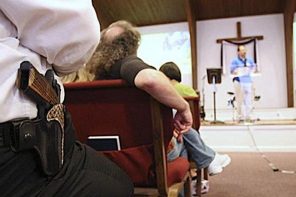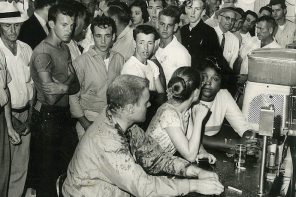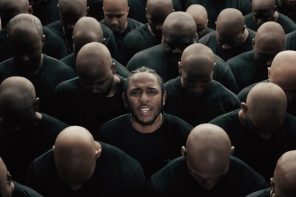A great deal can change in four years—just ask Martin Luther King Jr. The year of his brilliant and prophetic “I Have a Dream” speech, 1963, was itself a dream year for him. His speech captivated millions and paved the way for new Civil Rights legislation. Ralph Abernathy heralded it as “a prophecy of pure hope.” Joan Baez believed that “the breath of God thunder[ed] through him.” A teenaged Bill Clinton wept in his Southern living room. Time magazine named King “Man of the Year,” and the Nobel Peace Prize committee gave him its award in 1964.
Within four years, King’s dream and his reputation among many looked more like the sidewalks of riot-torn Newark and Detroit than the golden streets of the New Jerusalem foretold in the Bible. King dreamed of a time when the children of slaves and slaveowners would sit together at tables of brotherhood; instead white supremacists bombed black churches and killed little black girls. King dreamed that “one day every valley shall be exalted.” Instead, from the valleys of the South to the cities of the North, racial antagonism seethed. Chants of “black power” reverberated and the ghettoes exploded. Most whites either sat idly by and wondered why “the Negroes” were so angry; other whites who lived near African Americans moved away as far as their pocketbooks could take them. The dream of 1963 had become the nightmare of 1967.
Even among many African American ministers, King fell from favor. Only four years after the March on Washington, Vincent Harding wrote of “the days when Martin Luther King was the true prophet” as if they were part of a bygone past. Gayraud Wilmore saw black clergy in 1966 and 1967 tired of following King, believing that devotion to his principles of nonviolence meant “more attention to loving the enemy than doing something about the suffering of brothers and sisters.” In less than four years, King and his dream had gone from inspiring the nation to seemingly irrelevant, old-fashioned, or even detrimental to the cause of genuine equality.
President-elect Barack Obama is quite different from Reverend King. Obama has never been a pastor; he did not grow up in the segregated South; and Obama has been elected to a political office, while King held a prophetic office (by personal conviction and seeming acclamation). Yet four years may provide a sad resemblance. The chances for disenchantment seem eerily similar. If 2008 hearkens back to 1963, will 2012 be reminiscent of 1967? As so many politicians and pundits have commented, Obama will become President with more crises on his hands than fingers. His followers voted for “change” but what will change mean in manifest form?
The potential for dashed dreams and unfulfilled prophecies is high. How shall we avoid disappointment? How can we not get stuck in a nightmare of a dream? If “Yes We Can” sounds as distant in 2012 as “I Have a Dream” did in 1967, where will we turn for help? Perhaps we should turn to the words of another American prophet, W. E. B. Du Bois, and link them to the vision of King. Du Bois, who died only a day before King’s epic speech, called Americans not to dream, but to wake up. “Awake, awake” he implored Americans as the prophet Isaiah had for the Israelites. Seeing the “day of reckoning” at hand, Du Bois charged Americans to “put on thy strength.” King and Du Bois knew—and President-elect Obama knows—that faith takes works, hope demands honesty, and love needs justice.
With Obama’s election, I hope that we awake from our dreaming and create the America King lived and died for.




